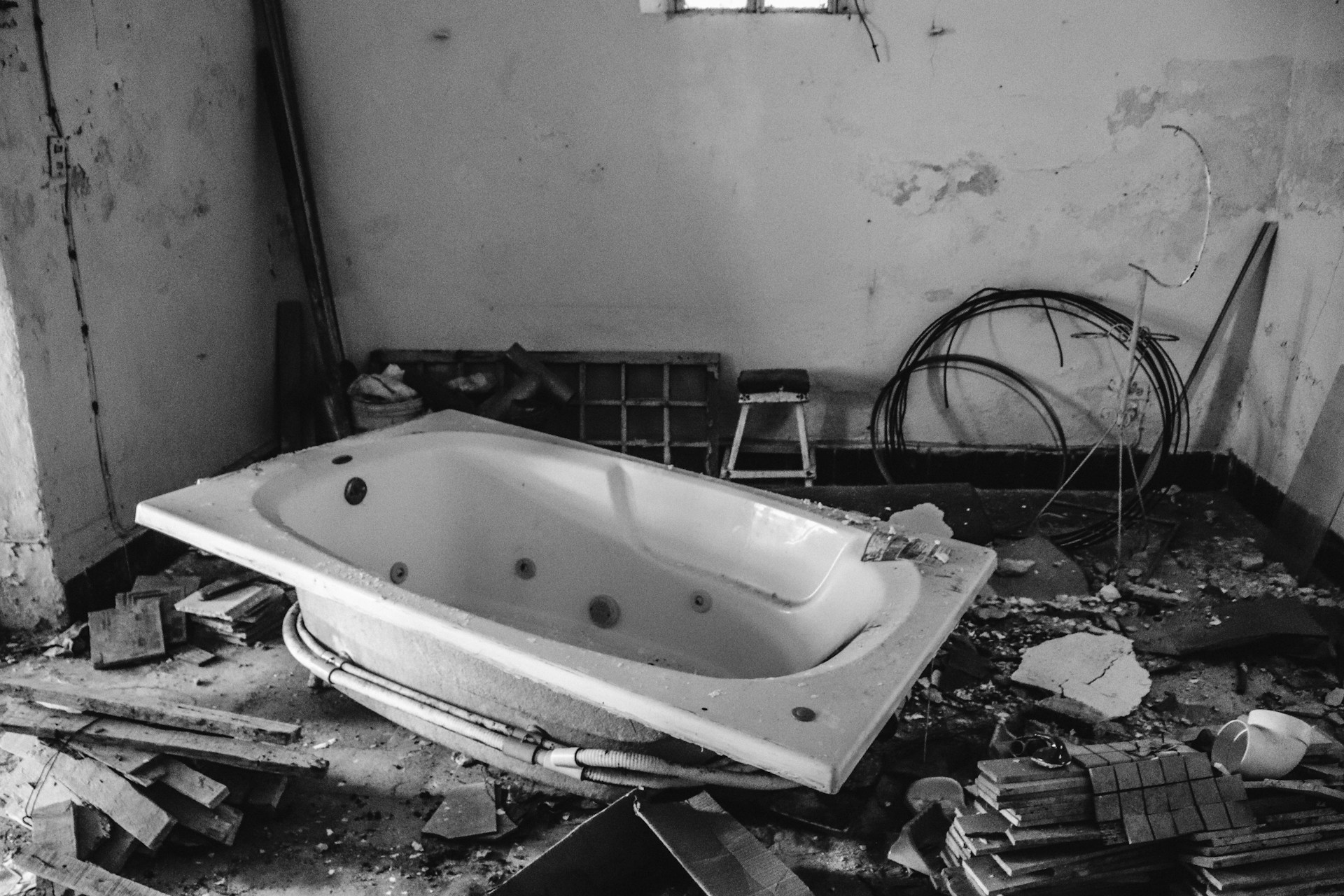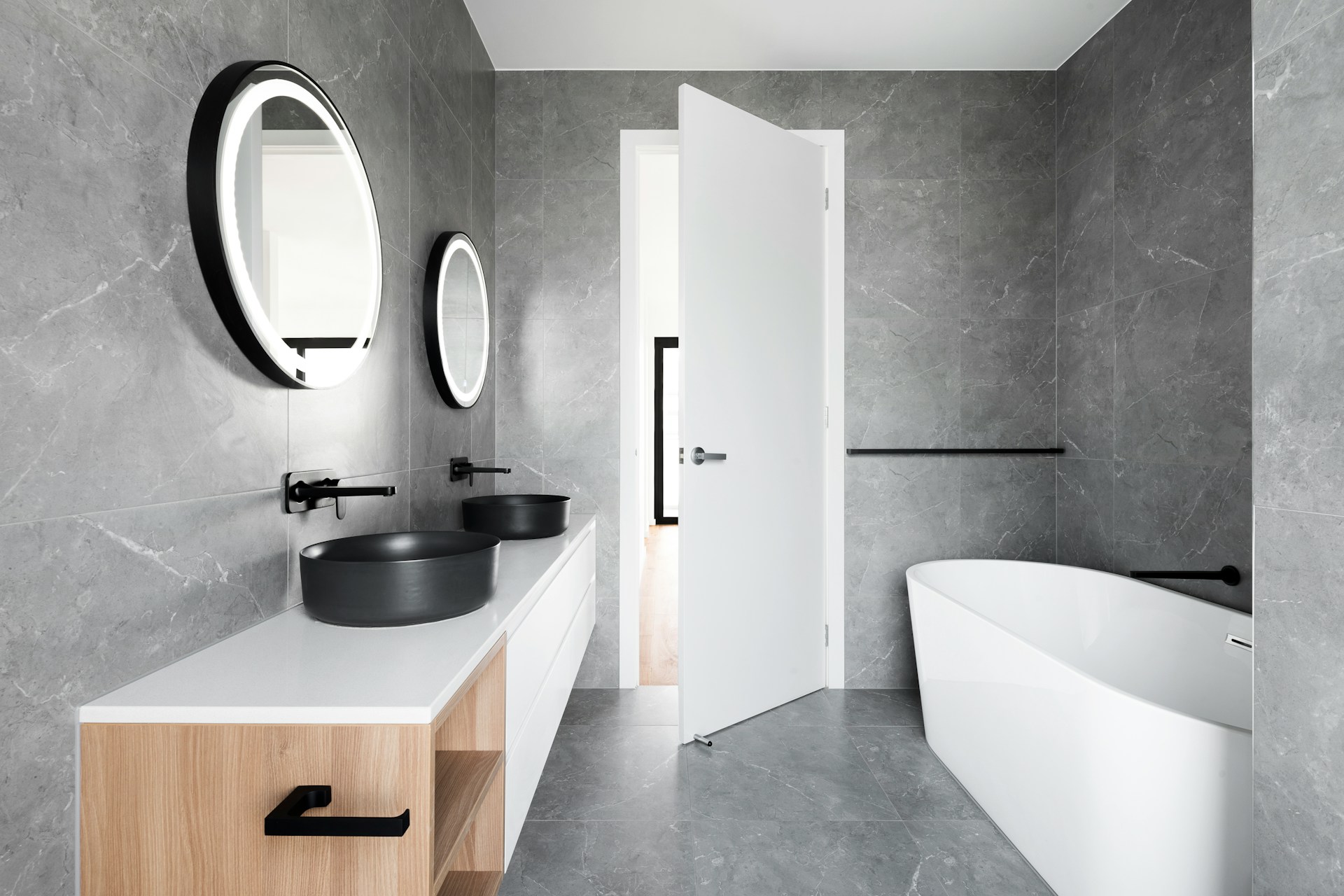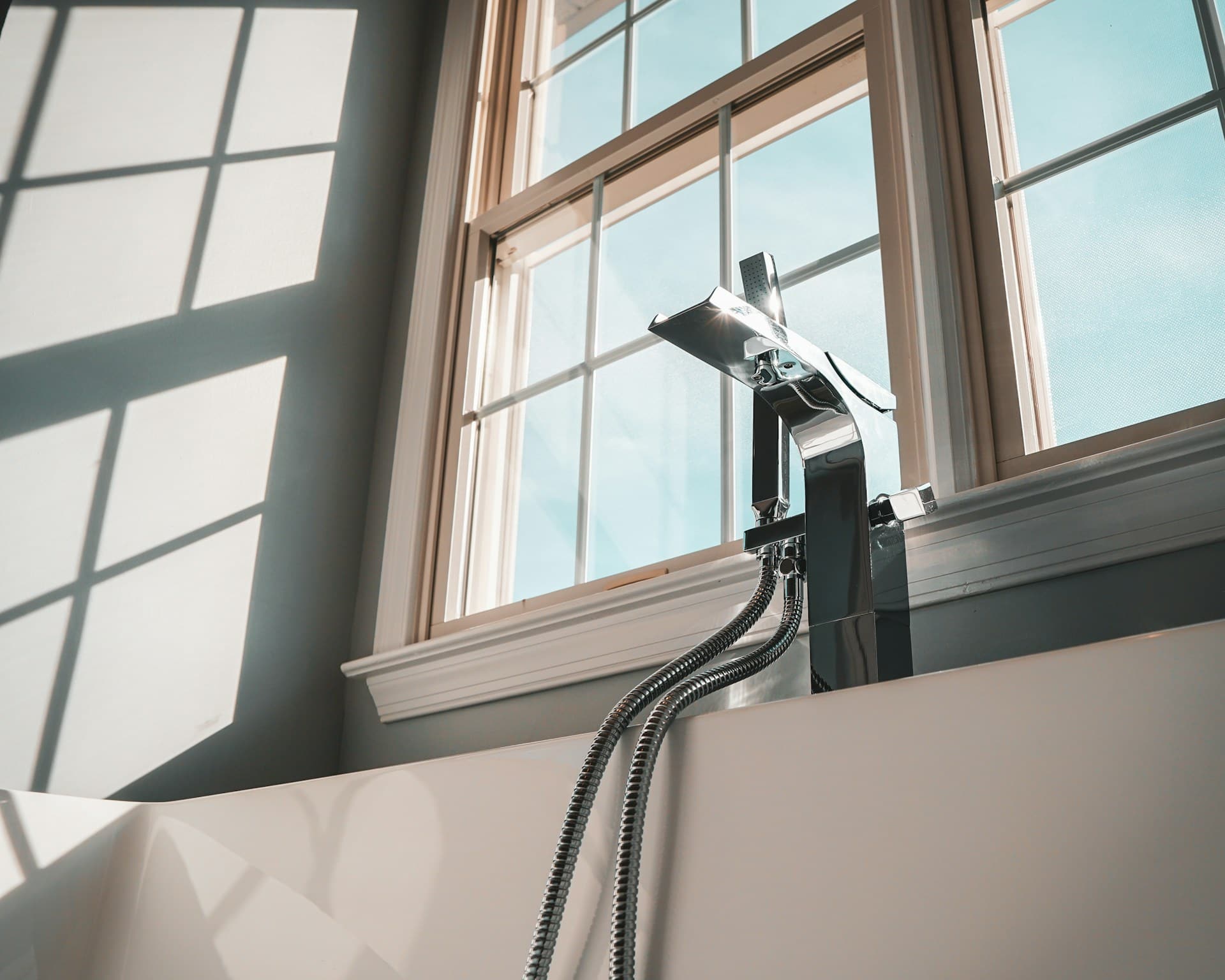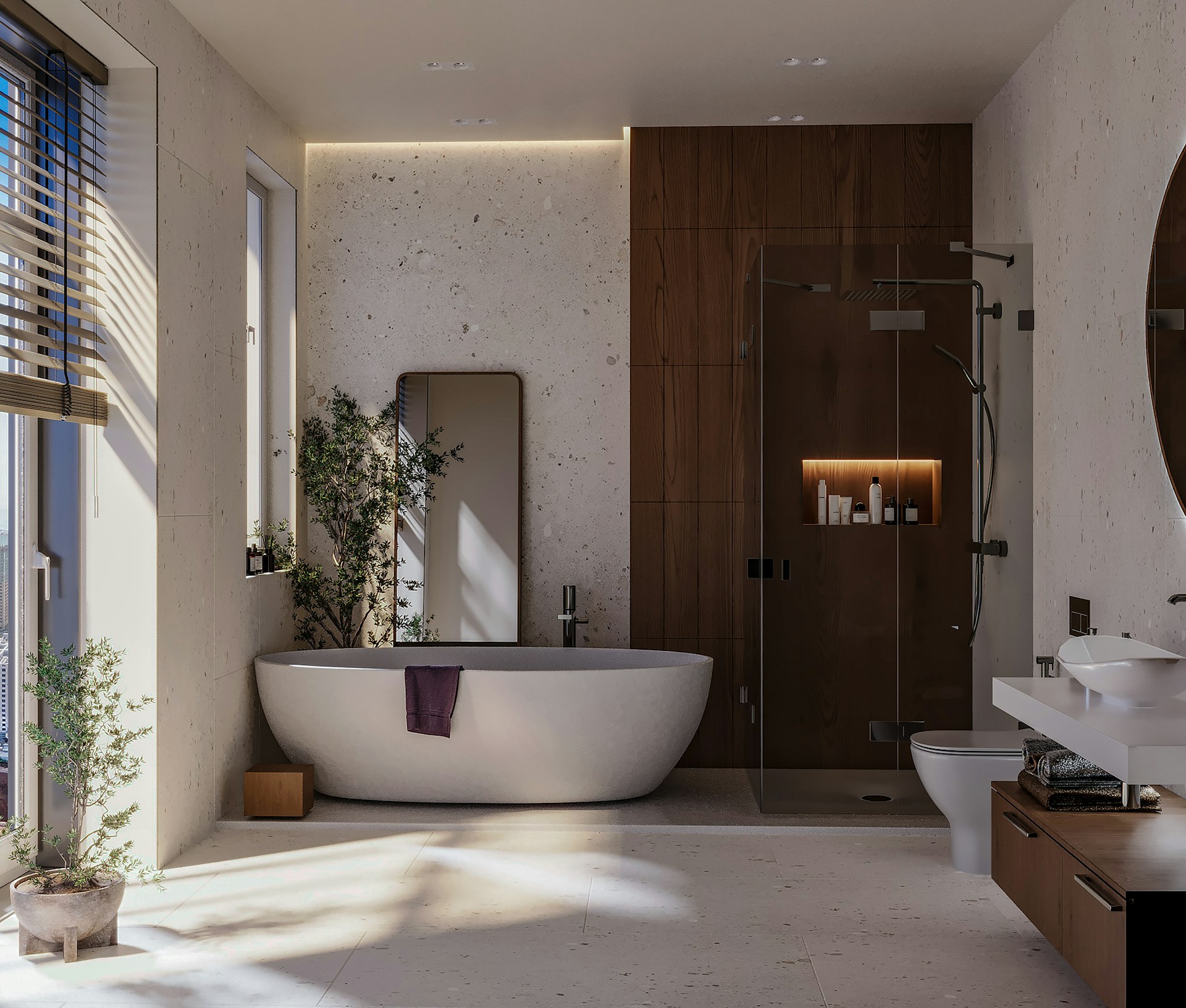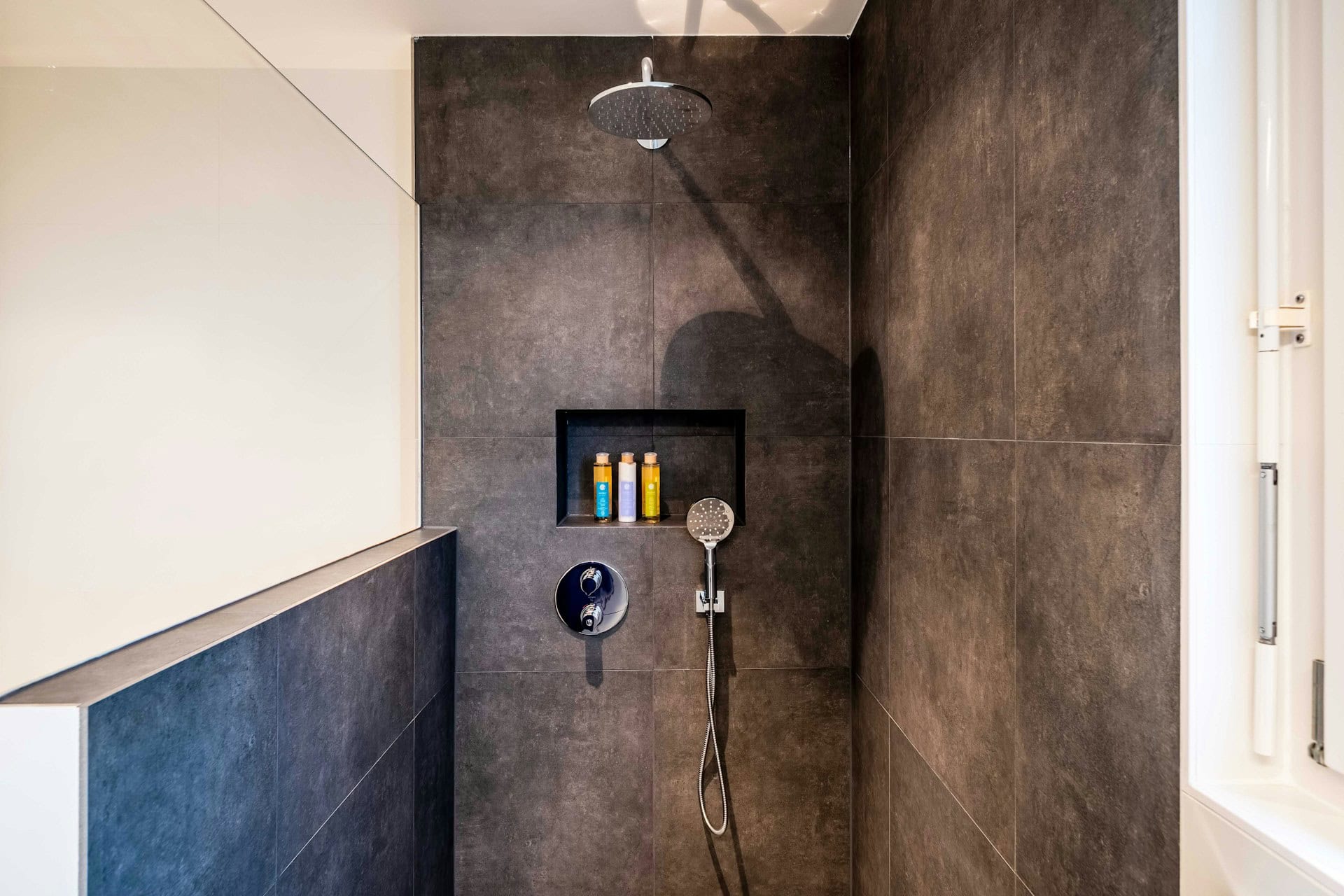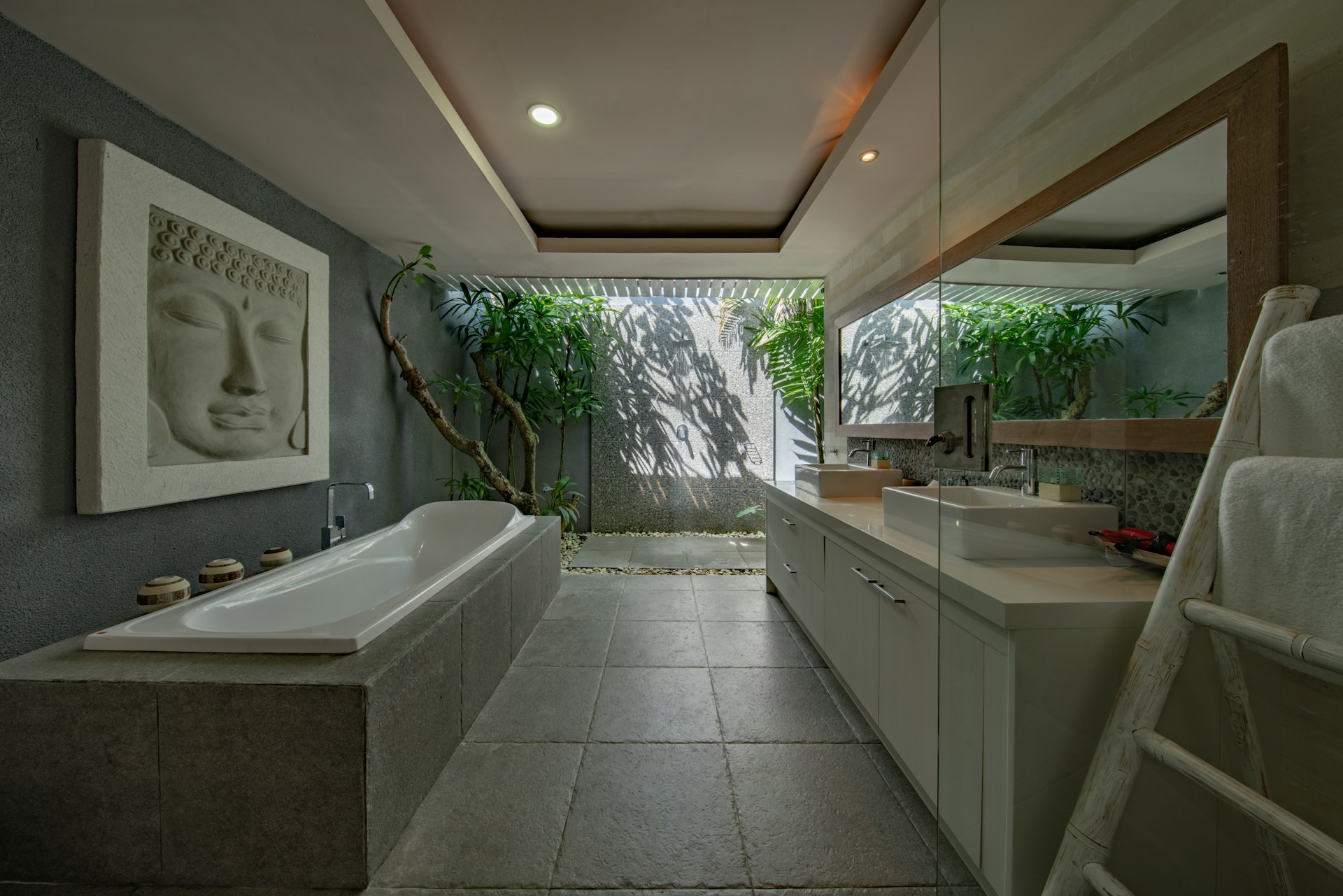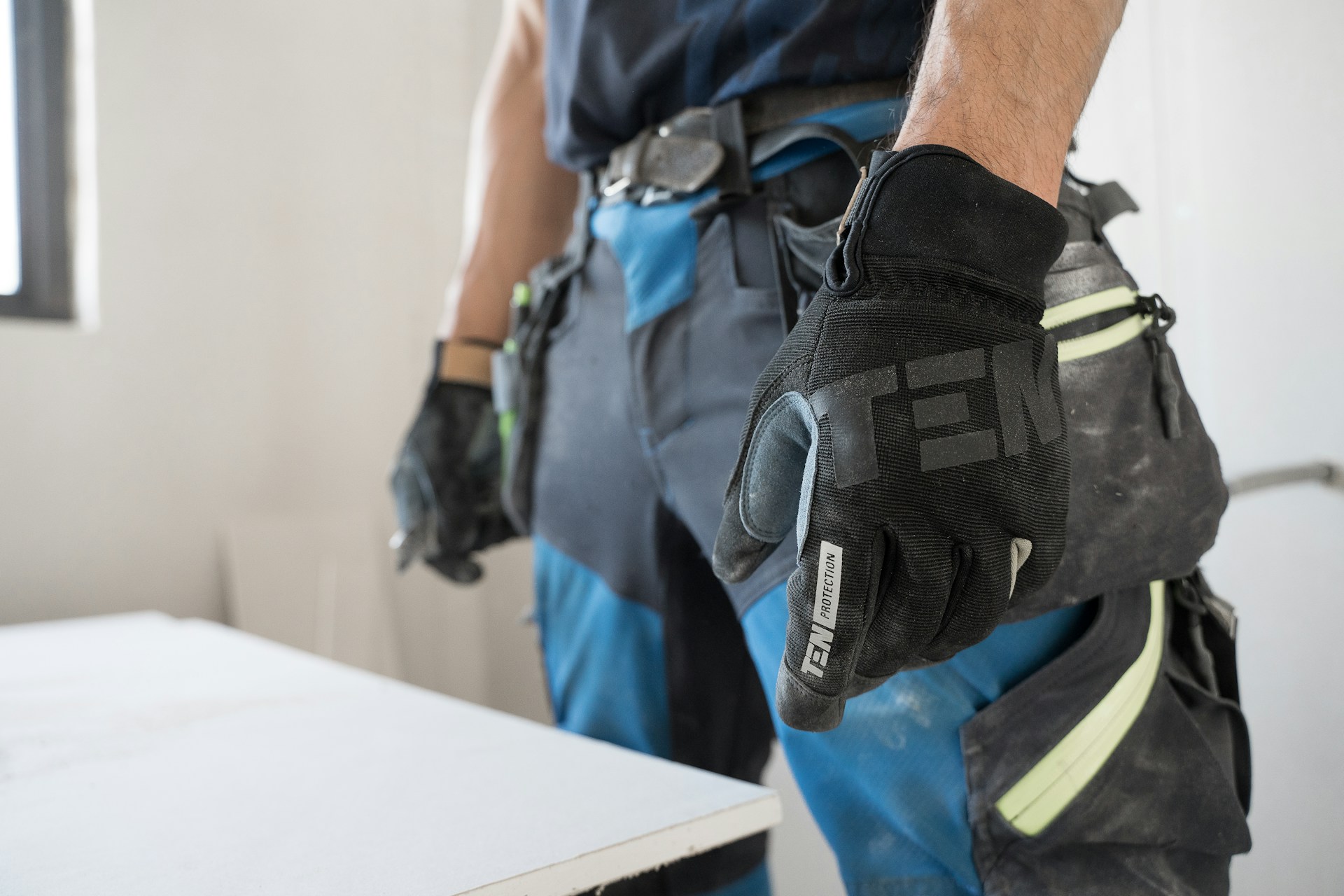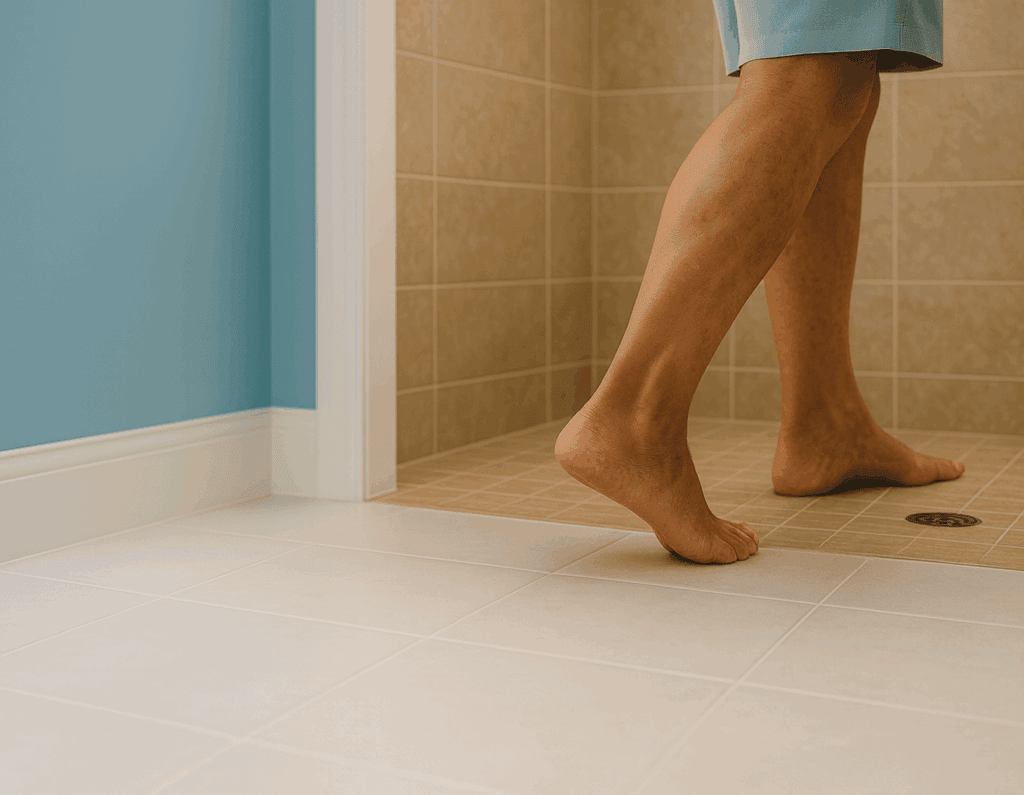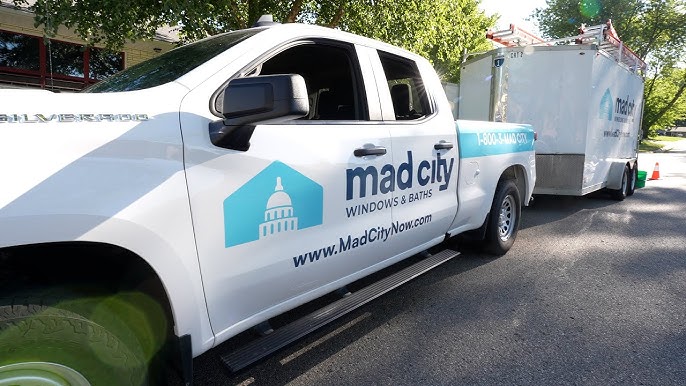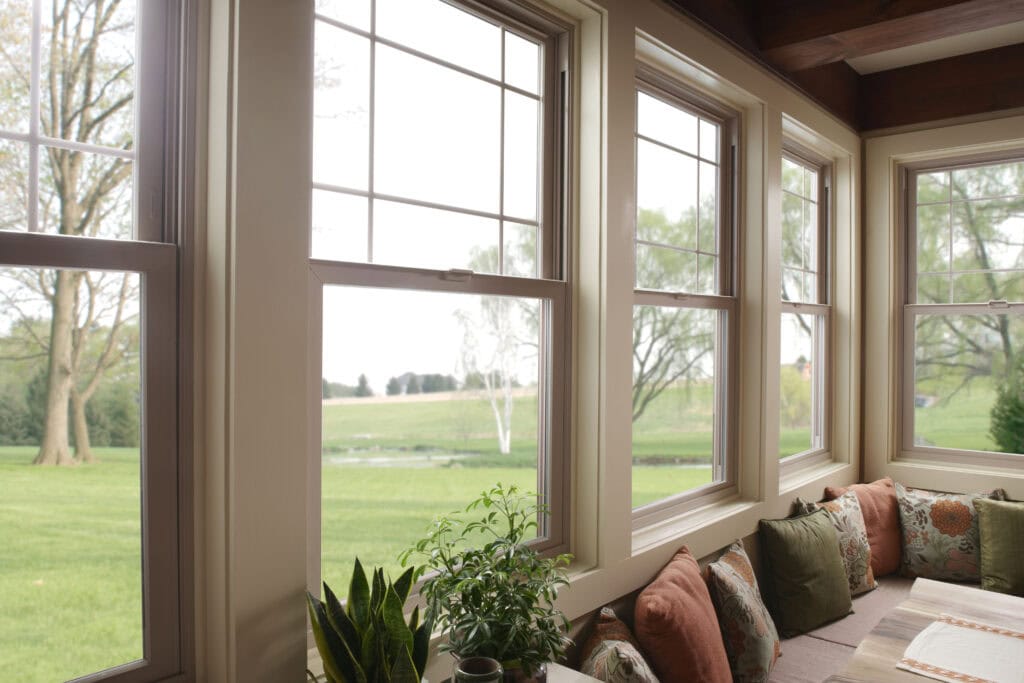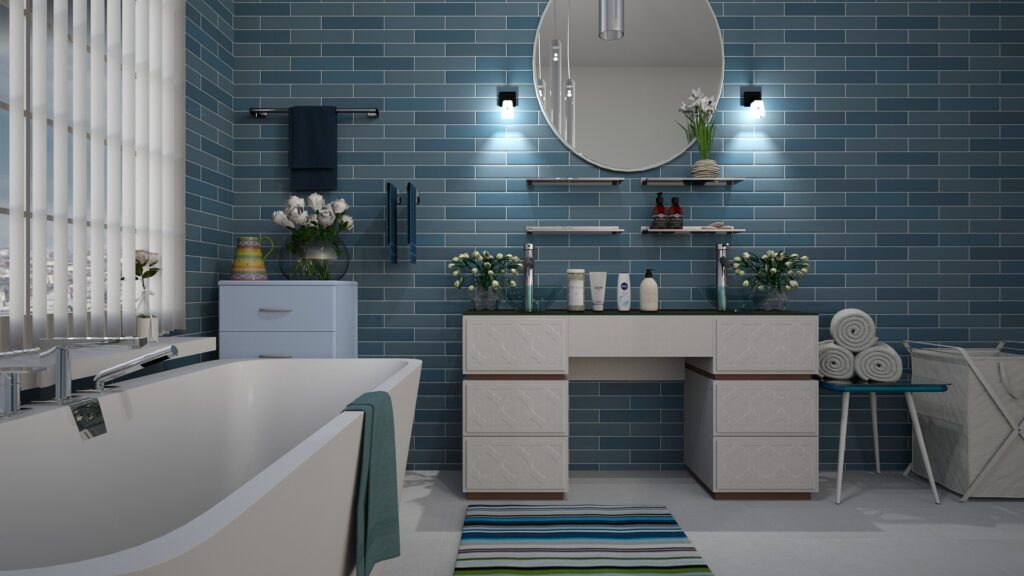
Picture yourself in your ideal bathroom, a sleek, stylish space that’s both functional and beautiful. Maybe you’re dreaming of a walk-in shower with clean lines, luxurious new flooring that adds warmth, or storage that finally keeps everything organized and within reach.
Transforming this heavily used space can cost anywhere from $6,500 to $18,000, with the average landing at $12,000. If you’re dreaming big with high-end features, the price can climb above $30,000. It’s exciting but can also feel overwhelming when trying to figure out how to make it all work.
That’s why today, we’ll walk you through the nitty gritty of bathroom remodel costs and explore cost-saving tips that will let you have a more nuanced perspective on the bathroom you’ve always wanted.
Difference Between: Bathroom Renovation vs. Bathroom Remodel
You’ve heard the terms “renovation” and “remodel” tossed around, but what do they really mean? Understanding the distinction isn’t just about semantics; it’s the key to choosing the right project for your goals, budget, and timeline.
Bathroom Remodel
A bathroom remodel is for those ready to make big changes. Imagine gutting the entire space, moving your sink to the opposite wall, or swapping a tub for a walk-in shower. Remodels involve significant functional or structural updates, such as rerouting plumbing or altering the floor plan. The average cost of a bathroom remodel starts at $20,000 and offers a complete transformation of your space.
If you’re tired of cramming into a tiny shower or want to create a luxurious spa-like retreat, a remodel lets you reimagine the layout to maximize space and usability. However, these projects often require professional help, permits for structural changes, and a hefty budget.
Bathroom Renovation
A bathroom renovation focuses on improving the existing layout without major structural changes. Think of it as a way to breathe new life into an outdated space. Renovations typically include replacing fixtures, repainting walls, retiling the shower, or upgrading the vanity. These projects are much less invasive and generally cost under $15,000, making them a practical choice for homeowners on a tighter budget.
For example, if your bathroom feels outdated but functions well, a renovation can modernize it without the hassle of major construction. You might swap out an old, cracked sink for a sleek new model or refresh your flooring with affordable ceramic tiles. These smaller changes can dramatically improve the look and feel of the space while keeping costs manageable.
Key Factors Influencing Cost
Understanding the cost of a bathroom remodel starts with identifying what exactly affects pricing. These include the size of the bathroom, the scope of work, the materials you choose, and regional labor costs:
Bathroom Size
How much space needs to be worked on plays the biggest role in the overall bathroom remodel cost.
- Smaller bathrooms, measuring 25–50 square feet, typically cost between $1,800 and $12,500, depending on the materials and complexity of the updates.
- Medium-sized bathrooms, around 75 square feet, cost more — ranging from $5,300 to $18,800 — due to the additional square footage and fixtures involved.
- Large bathrooms, over 100 square feet, can cost upwards of $25,000, especially if luxury upgrades or structural changes are included.
Scope of Work
Cosmetic updates, such as replacing fixtures, retiling, or repainting, are more budget-friendly and add value without major construction. On the other hand, layout changes that require moving plumbing or electrical work and structural updates can dramatically increase the total project cost.
Materials
Budget-friendly options like fiberglass or acrylic tubs range from $200 to $800, offering durability at a lower cost. If you’re into a more premium finish, you’re looking at somewhere between $2,000 and $5,000 for cast iron or cultured marble tubs. More expensive, but they do give off that luxurious feel that can last a lifetime.
How about the floor? Flooring options like ceramic tiles typically start at $4 per square foot, while high-end marble tiles can cost up to $60 per square foot.
Labor Costs and Regional Differences
Labor makes up about 40%–65% of the total cost. It is often more expensive than the materials. Rates vary depending on your location and the type of professional you hire.
- Plumbers typically charge between $45 and $200 per hour, while electricians have similar rates of $50 to $200 per hour.
- General contractors manage the overall project and usually charge 20–30% of the total project cost.
- Then, labor costs also fluctuate regionally; urban areas often have higher labor rates than rural locations.
Key Remodel Elements and Costs
A bathroom remodel is a mix of big decisions and small details, and each choice impacts the final cost. From the type of shower you install to the flooring you select, every element plays a role in creating a functional, beautiful space.
Bathtub and Shower
The bathtub or shower often defines the look and feel of a bathroom. If you dream of a modern, minimalist vibe, a walk-in shower might be the perfect upgrade. These sleek designs cost between $4,200 and $8,500, depending on materials and labor.
Want to go even further? Converting your bathroom into a wet room, an open, fully waterproofed space, gives off that luxurious feel but comes with a wide price range of $2,000 to $30,000. If you’re more inclined toward the comfort of a bath, replacing a standard tub typically costs $4,200 to $11,000, with the size and material heavily influencing the price. A cast iron tub adds timeless appeal, while acrylic options keep costs lower.
Plumbing
Behind every stunning bathroom is a well-functioning plumbing system. Installing new pipes costs anywhere from $0.50 to $8 per linear foot, depending on the material. Most homeowners spend around $800 for general plumbing updates, like replacing fixtures or repairing worn pipes. However, more complex work, such as moving a drain or relocating a toilet, can quickly add to the total bathroom remodel cost.
Worktops and Cabinets
Your bathroom cabinets and worktops don’t just add storage; they define the room’s aesthetic. Stock cabinets are the most budget-friendly picks, costing between $200 and $600 per unit, and come in a variety of sizes and finishes. If you want a more customized look, semi-custom cabinets offer flexibility without the high price of bespoke options.
If money isn’t an issue, a fully custom vanity can cost up to $10,000, giving you the chance to create a unique piece tailored to your style and storage needs. For countertops, affordable materials like laminate cost between $8–$27 per square foot, while premium options like quartz or granite can cost over $100 per square foot.
Flooring and Heating
Budget-friendly materials, like ceramic, start at $4 per square foot, while more upscale picks, such as natural stone, can climb to $22 per square foot or more. If you’re after a touch of royalty, consider installing heated tiles. At $20 to $40 per square foot, they offer unmatched luxury that pairs with comfort, especially in colder climates, and add significant value to your home.
Examples of Calculating Bathroom Remodeling Costs by Size
Want to have an idea of the bathroom remodel cost based on size? Here are three examples to guide you:
Small Bathroom (Example: 5×7 Feet): Budget and Premium Options
If you’re working with a small bathroom, you can achieve a fresh, updated look on a budget. Replacing fixtures, painting walls, and retiling floors can cost between $2,500 and $6,000, depending on the materials you choose. While not as exciting, this is ideal for guest bathrooms or powder rooms where functionality trumps aesthetics.
A more luxurious finish can raise the price of the overall bathroom remodel cost to upwards of $10,000. This could include installing a custom walk-in shower, adding high-end tiles, or replacing a standard sink with a high-end option. Although the space is smaller, these upgrades can significantly enhance the bathroom’s style and comfort.
Medium Bathroom: Cost Ratio of Materials and Labor
For these spaces, materials generally account for 50%–60% of the total bathroom remodel cost, while labor constitutes the remaining 40%–50%. A remodel in this category can range from $10,000 to $25,000, depending on the extent of the upgrades.
Master Bathroom: Examples of Comprehensive Remodeling with Layout Changes
Master bathrooms are the crown jewel of a home’s bathroom spaces, offering the chance to create a luxurious, spa-like experience. However, these remodels come with a higher price tag. Costs typically range from $20,000 to $55,000, depending on the bathroom size and features included.
Examples of Average Cost for Type of Bathroom Remodeling
Bathroom remodeling can range from a simple refresh to a full-scale transformation, with costs depending on the type of project you undertake. Looking for a budget-friendly update or a high-end renovation? Understanding the average costs for each type of remodel helps you plan effectively.
Cosmetic Renovation: Basic Updates Such as Painting, New Fixtures and Hardware
Cosmetic renovation focuses on refreshing the space without any structural changes. Think of it as giving your bathroom a facelift: repainting the bathroom walls, replacing faucets, installing new hardware, or upgrading light fixtures. These projects typically cost between $1,200 and $5,000. They are an affordable option for homeowners who want to modernize their bathroom’s aesthetic without breaking the bank.
Mid-Level Renovation: Tile, Tub and Countertop Upgrades
A mid-level renovation goes beyond surface updates to enhance the bathroom’s functionality and appearance. These often include installing new tiles, replacing a bathtub, or upgrading countertops. Unlike its cosmetic counterpart, mid-level projects typically involve higher-quality materials and more skilled labor.
The average cost for this type of remodel ranges from $6,000 to $15,000. Replacing a standard tub costs between $4,200 and $11,000, while upgrading to stone or quartz countertops adds another $400 to $4,300.
New tiles for the bathroom floor and walls, costing anywhere from $4 to $60 per square foot, depending on the material, can dramatically improve the room’s look and durability.
Luxury Renovation: High-End Materials, Custom Cabinets, and Premium Fixtures
Luxury renovations often involve walk-in showers, heated flooring, and freestanding tubs. Costs start at $25,000 and can exceed $75,000, depending on the level of customization. A typical wet room conversion ranges from $2,000 to $30,000, and custom vanities are easily upwards of $10,000.
DIY vs. Hiring Professionals
Both DIY projects and hiring professionals options have their advantages and limitations, and choosing the right approach depends on your skills, time, and the complexity of your bathroom remodel project.
DIY Pros
- Eliminates labor costs
- You handle every design detail
- Learn valuable home improvement techniques
- Work at your own pace
- Ideal for simple tasks like painting or replacing fixtures
DIY Cons
- Complex tasks, like plumbing or electrical work, are challenging
- Mistakes can increase costs and time
- Projects may take weeks longer without professional help
- Improper handling of tools or materials can lead to accidents
- Risk of not meeting building codes, which could result in fines
Hiring Professionals Pros
- Skilled in handling complex renovations, such as plumbing reroutes
- Faster project completion, often within 3–6 weeks
- High-standard finishes and compliance with building codes
- Professionals often offer warranties for their work
- Less planning and coordination required on your part
Hiring Professionals Cons
- Professionals may prioritize efficiency over personal preferences
- Coordinating multiple contractors can delay progress
Benefits of DIY
DIY projects can be tempting because they seem like a great way to save on labor costs, which often make up a significant portion of the budget. Simple tasks like painting walls, swapping out a faucet, or installing a new showerhead (typically $50–$100) may be manageable for many homeowners and offer a sense of personal accomplishment. DIY also gives you control over the design process, allowing for customization to match your vision.
However, DIY is best suited for minor updates and cosmetic changes. Larger projects, especially those involving plumbing, electrical work, or structural modifications, often require specialized skills and tools. Mistakes in these areas can lead to costly repairs and safety hazards down the road. For complex remodeling tasks, hiring a professional not only ensures the job is done safely and correctly but also saves time and reduces stress, making it a smarter investment in the long run.
When to Hire a Pro
Imagine that you’re trying to relocate a toilet and accidentally hit a pipe. Suddenly, that DIY adventure turns into an expensive emergency. This is why we believe larger or more complicated bathroom remodels are better off leaving to the pros.
Tasks like rerouting plumbing (costing $0.50 to $8 per linear foot, plus labor), rewiring electrical systems, or moving a shower are best left to professionals. Licensed contractors ensure your remodel meets local building codes and is completed safely.
Professionals also bring expertise and efficiency to the table, especially for larger renovations where multiple trades (electricians, plumbers, and tile setters) need to be coordinated. Think of it as spending more for peace of mind and convenience. Hiring a professional or a team ensures that the work is done right the first time.
Main Stages of the Bathroom Renovation Process and Average Duration
- Planning and budgeting (2–3 weeks): Define your goals, create a budget, and consult professionals if needed. Factor in unexpected expenses, such as water damage repairs, which cost $3.75 to $7 per square foot.
- Demolition (1–2 days): Remove old fixtures, flooring, and walls. Expect to spend $1,000 to $2,300 for professional demolition services.
- Plumbing and electrical work (1–4 days): Rerouting pipes and wiring is critical at this stage. Labor costs range from $50 to $200 per hour, depending on complexity.
- Installation of new fixtures and finishes (1–4 days): Install cabinets, flooring, tiles, and plumbing fixtures. Flooring installation costs $2 to $22 per square foot, while tile ranges from $0.50 to $15 per square foot.
- Final touches and cleanup (1 week): Add finishing details, like light fixtures, and complete post-construction cleaning, which costs $70 to $170.
Tips for Reducing Cost
The answer to the question “how much does a bathroom remodel cost?” can be highly dependent on your situation. Regardless of your budget, we listed a few quick and easy tips to help keep costs down:
- Maximize the existing layout of your bathroom to avoid expensive plumbing relocations (costs ranging from $0.50 to $8 per linear foot).
- Use prefabricated fixtures like shower kits ($600–$1,800) to save money.
- Handle simple DIY tasks like painting, installing cabinet hardware, or replacing light fixtures.
- Browse discounted remnants of tiles and countertops for savings.
- Prioritize high-impact upgrades, like new flooring or fresh paint.
Common Mistakes to Avoid
Bathroom remodels can quickly go over budget if certain mistakes are made. One common mistake is underestimating how much it will cost. Always include a 10–20% contingency fund for unexpected expenses like hidden water damage.
Another oversight is forgetting about ventilation. Proper ventilation prevents mold and mildew, which can lead to expensive repairs and much more costly health problems.
Choosing poor-quality materials can lead to costly long-term maintenance. Always get the necessary permits to avoid fines or having to redo work.
Finally, hiring unqualified contractors can result in poor quality work. Verify licenses and read reviews before choosing professionals.
Need Additional Consultation to Make the Right Choice?
Unsure about where to start with your bathroom remodel? Every bathroom is unique, and figuring out the best approach can feel like a lot to handle.
That’s where we can help. At Mad City Windows, our 20+ years of experience means we’ve seen and done it all: from refreshing small guest bathrooms to creating luxurious master suites. We specialize in helping homeowners make decisions that fit their style, needs, and budget.
Reach out for a consultation today!
FAQ
How Much Does It Cost to Remodel a Bathroom?
Bathroom remodel costs can vary significantly, with the national average cost at $12,000. Most projects fall between $6,500 and $30,000, depending on bathroom size, materials, and labor.
What Is the Most Expensive Part of a Bathroom Renovation?
The most expensive aspects of a bathroom renovation typically involve relocating plumbing, such as moving a toilet or shower. These can add thousands to labor and material costs. Custom features like a walk-in shower with frameless glass or built-in cabinetry also significantly increase the price.
How Much Does It Cost to Remodel a Small Bathroom?
For a small bathroom, basic updates like retiling, painting, and replacing fixtures usually cost $2,500 to $6,000. Premium upgrades, such as installing a custom vanity or converting to a walk-in shower, can push costs to above $10,000.
How Long Does It Take to Remodel a Bathroom?
A professional bathroom remodel typically takes three to five weeks, depending on the complexity of the project. Tasks like demolition, plumbing, and electrical work extend timelines for larger or more intricate remodels.
Do I Need a Permit to Remodel My Bathroom?
Yes, permits are usually required for plumbing, electrical work, or structural changes to ensure safety and code compliance. Permit costs range from $450 to $2,000, depending on the scope of the project and local regulations. Cosmetic updates, like painting or replacing hardware, generally don’t require permits.
How to Plan a Bathroom Remodel?
Start by listing your goals. Want a simple refresh or a full renovation? Set a realistic budget and research average costs for your desired changes. Consult professionals for advice and ensure your plans comply with local building codes. Always include a 10–20% contingency for unexpected expenses.
